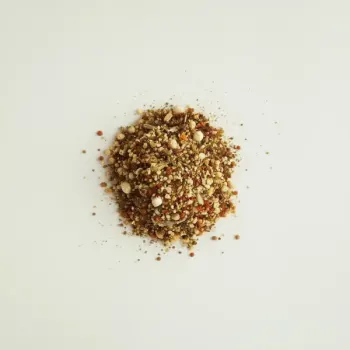Oregano is a robust, earthy herb often used in Mediterranean dishes, while Italian Seasoning is a balanced blend of several herbs including oregano, used to enhance a variety of recipes.

Oregano is a culinary herb from the mint family that is commonly used in Mediterranean and Mexican cooking. Its leaves contain a potent aroma and flavor that is earthy, sharp, and slightly bitter, often described as quintessential to Italian dishes.

Italian Seasoning is a blend of ground herbs used to flavor many Italian dishes. The mix typically includes basil, oregano, rosemary, thyme, and marjoram. Its flavor is versatile and balanced, providing a convenient way to add a complex bouquet to recipes.
Oregano is a single herb with a specific, strong flavor profile, whereas Italian Seasoning combines multiple herbs, offering a more rounded and less intense flavor. Oregano's robust taste is best for dishes where it can shine on its own, while Italian Seasoning is used to add a layered herbal character without overpowering other ingredients.

Your ultimate Recipe Box, Meal Planner, and Cooking Class all in one
Best used in simple tomato sauces or on classic Margherita pizzas where its bold flavor complements the sweetness of tomatoes. Oregano can be sprinkled on top or infused into the sauce while cooking. Ideal for more complex sauces with multiple ingredients or for seasoning meat-heavy pizzas where its variety of herbs can enhance the overall taste without dominating the dish.
Oregano, with its intense flavor, is excellent for rubs on grilled meats like lamb or beef, offering a Mediterranean flair. It's best used sparingly to avoid overpowering the meat's natural flavors. The blend of herbs in Italian Seasoning makes it a great all-purpose seasoning for roasted chicken or pork, where it imparts a subtle, herby background note.
Oregano can be a dominant flavor in broths or vegetable-based soups like minestrone, especially when fresh leaves are used. Italian Seasoning is suited for a wide range of soups and stews, adding a complex herbal note that complements both meat and vegetable ingredients.
In a vinaigrette or Greek salad dressing, oregano can provide a distinctive sharp and tangy taste, perfect with feta and olives. For a more general Italian dressing, the blend of herbs in Italian Seasoning can provide a more nuanced flavor suitable for a variety of salads.
No, oregano is a single herb with a distinct flavor, while Italian Seasoning is a blend of several herbs, including oregano.
Yes, but keep in mind that Italian Seasoning will introduce additional herb flavors and may change the dish's flavor profile.
Italian Seasoning typically includes basil, oregano, rosemary, thyme, and marjoram.
It depends on the recipe. Dried oregano has a more concentrated flavor and is great for cooking. Fresh oregano is milder and good for garnishing and fresh applications.
Generally, one tablespoon of fresh oregano equates to one teaspoon of dried oregano, as dried herbs are more potent.